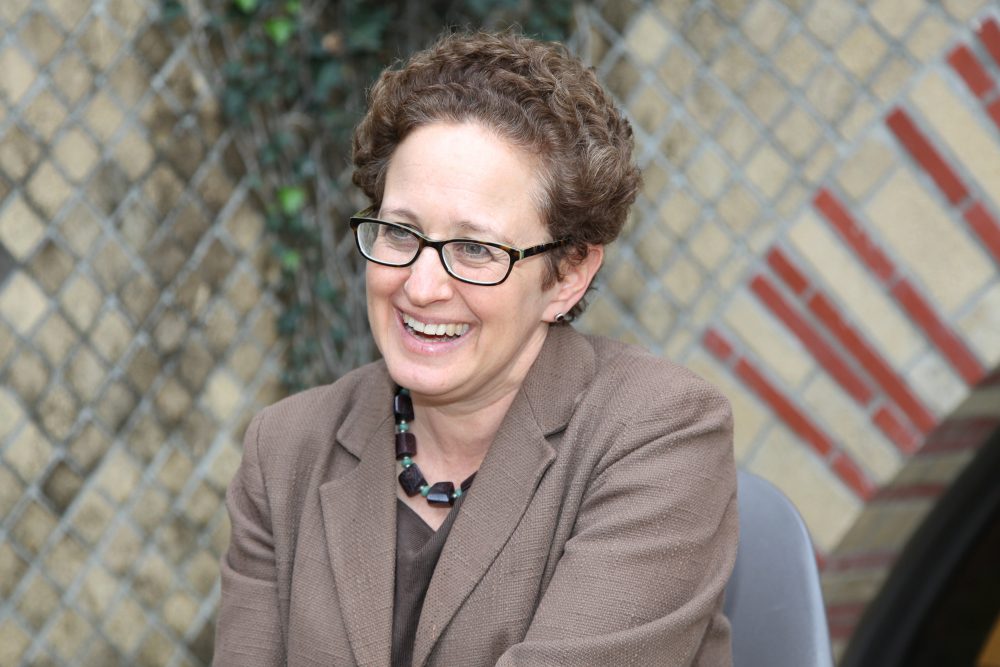
Photo by Aaron Salcido.
Melissa Lane is Professor of Politics at Princeton University, where she is also Director of the University Center for Human Values, and an associated faculty member in the Departments of Classics and of Philosophy. Prior to that, she served as an aide to then-President Oscar Arias Sánchez of Costa Rica. Before taking part in a Zócalo/Getty Villa panel discussion titled “What Can the Ancient World Teach Us About Living Sustainably?” at the Getty Villa, she spoke in the green room about working in Costa Rica, picnicking at Will Rogers State Historic Park, and reading philosophy and hiking on the Isle of Arran.
How did you end up being an aide to President Oscar Arias Sánchez?
It was my final year as an undergraduate at Harvard. And it was the late ’80s, so many of us were passionate about wanting to work in Central America. And he was the [Harvard] graduation speaker that year, and so he had already won the Nobel Peace Prize but the peace process was still unfolding. And so I mentioned to an administrator at the college that I was so inspired by his speech, “I want to go and work in Central America.” And then the administrator met him at a dinner and said, “We have this student who was very inspired by you.” And he said, “Well, why doesn’t she come and work for me?” And then what was amazing—I think it’s still ongoing—is that every year he had a Harvard student work in his office.
And what sort of things did you do for him?
He had done a Ph.D. in England and had very good English of course, so the main things I did was write letters in English, write speeches in English, sometimes translate Spanish to English. So it was mainly that. But I was in his private office, which was only about 10 people. For me it was an unbelievable education, it was an amazing experience.
Apart from that, was there a particular teacher who really influenced you?
Many, I would say. Judith Shklar had fled Latvia with her family, because of the Germans, and had gone to Canada, and grown up in Canada, and was teaching at Harvard. I wrote my thesis with her, on nature and the concept of social critique in Rousseau and Thoreau. But I remember her asking me, “What’s the fundamental political ideal that’s behind these critiques?” And really it was this kind of fundamental ideal of independence—what did that mean and how could you achieve it? Coming to understand that was a very powerful thing for me.
What are you reading for pleasure?
I just bought these new short stories by Elizabeth Strout, who writes the Olive Kitteridge books. They’re wonderful; they kind of pick up characters from her previous novels. There’s something about her style, which is so deceptively plain.
How did your professional interest in the Greeks and the environment, and the intersection of the two, get started?
For the Greeks it does go back to childhood. I wish the Getty Villa had been here when I was a child! I grew up in L.A.; by the time I was growing up, later, it was open, but not in my very youngest years. I did love Greek mythology, as a lot of people do. I was very into Edith Hamilton’s writings. I had a chance to study Latin in public schools here, but I didn’t get the chance to study the Greeks properly until I was in college.
You lived in England and taught at Cambridge for several years. Did you have favorite places to visit?
I love Scotland, so I used to go different places. Near Oban, in particular, and then also the Isle of Arran. You should always go to Scotland with me, because I always have perfect weather. I did reading parties there—it’s kind of an English-Scottish tradition where you spend half the day reading philosophy and half the day hiking.
And end up at the pub.
Exactly.
What’s one of your happiest childhood memories?
I remember we used to have a picnic every year with a group of families at Will Rogers State Park. And we would swim and eat and play games, and it was just a wonderful day out with friends and family.
Do you come back to L.A. often? Do you have family here?
My parents are still here, so I do come back. They also meet us elsewhere. We love it now. I have to admit, when I was growing up here I was a little bit of a snob. I thought, “I want to go to the East Coast and be an intellectual! Or even the Bay Area, that’s much more intellectual!” And now, whenever we spend time here—we did spend a summer here a few years ago—and, as you know, every weekend that summer you could go to a different part of L.A., and not go to the same place twice, and in every place there was more incredible linguistic, ethnic, racial diversity, there were more art venues, there were more theaters. And it was funny, because the parents of a friend of mine retired from L.A. to the Bay Area a few years ago, and my friend was saying, “Oh, we’re a bit worried about them, because there’s so much less to do in the Bay Area.” My first reaction was, “Oh no, the Bay Area is the mecca of culture.” But then you realize L.A. has far and away more things going on here. And my husband is English, and English people have a kind of love affair with California—it’s a David Hockney kind of thing—so he’s always saying to me, “Why did you leave? What were you thinking?”



